Utilicraft Aerospace Plans
to Bring 1,000 Jobs to New Mexico
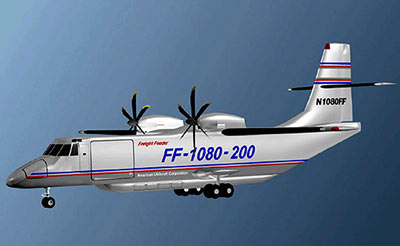 |
| The Albuquerque plant will assemble the FF-1080 Freight Feeder (pictured), a twin-engine turboprop plant that Utilicraft Aerospace is developing. |
ALBUQUERQUE, N.M. — The Navajo Nation
didn't just welcome Utilicraft Aerospace Industries'
new aircraft assembly plant to Albuquerque,
N.M. The Native American group on Dec. 8th agreed to buy a
25-percent stake in the start-up as well.
Utilicraft Aerospace will locate its plant at the Double Eagle II
Airport in west Albuquerque, CEO John J. Dupont explained. The facility
will perform final assembly work on a specialized feeder freight aircraft
that the company is developing.
Utilicraft Aerospace will employ some
150 workers at the plant within three years, said Dupont. And the
company's long-term plans, he added, call for creating three other
aircraft sub-assembly plants in the Navajo Nation. The country's largest
Indian reservation, the 14-million-acre (5.6-million-hectare) Navajo
Nation spans parts of three states — Arizona,
New Mexico and Utah.
Each of the three additional plants would
have a work force of about 250 employees, Dupont said.
"We're looking at about 1,000 jobs in
the state of New Mexico to build the airplane and to do final assembly
in Albuquerque at a production rate of 96 a year," he explained. "This
represents jobs, economic development and a great business opportunity
for the Navajo Nation."
The company's final short list also included
Dallas, Phoenix and San Antonio, Texas, said Rodney Doss, president
and CEO of Lawrenceville, Ga.-based Aero Mechanical
Industries, the parent firm of Utilicraft Aerospace. Aero Mechanical's
current business line is focused on helicopter parts.
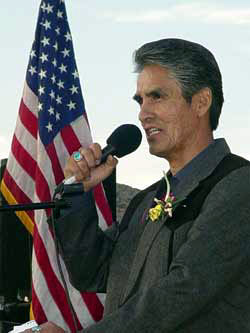 |
| "This is an awesome opportunity and industry to bring to the Navajo Nation," Navajo Nation President Joe Shirley Jr. (pictured) said of the tribal organization's agreement to become a 25-percent equity partner in Utilicraft Aerospace. "I feel very good, very confident about this." |
Dupont signed a memorandum of understanding at that meeting for the Navajo Nation to become a 25-percent equity partner in Utilicraft Aerospace. The terms of that memorandum call for the largest U.S. Indian tribe to invest about US$34 million for stock in the start-up. As part of its agreement with the tribal government, American Utilicraft is spinning off Utilicraft Aerospace Industries as a newly formed Nevada corporation. The company will also locate its headquarters in Albuquerque, Dupont said.
"I feel very good, very confident about this," Shirley said of the agreement. "This is an awesome opportunity and industry to bring to the Navajo Nation."
Utilicraft Aerospace said that the jobs in New Mexico will pay an average wage of $17 an hour. With a 40-hour week, that equates to annual wages of some $34,000. The average wage in Sandoval County is $25,000 a year, according to state officials.
The core of the company's business model revolves around the FF-1080 Freight Feeder aircraft. The plane has been in development for 13 years. Aero Mechanical filed its first copyright on the aircraft in
 |
| Utilicraft Aerospace will locate in Double Eagle II Airport in west Albuquerque. |
Utilicraft Aerospace's business plan projects a two-year final development program, leading to certification from the Federal Aviation Administration. Initial production of the FF-1080 will begin after the FAA's approval is secured. Dupont didn't estimate when the Albuquerque plant would go online.
The early market response to the FF-1080 has to be encouraging for the start-up. Utilicraft Aerospace has an agreement with Brisbane, Australia-based Global Air Group to purchase of 100 FF-1080s for $1.2 billion, Dupont said. The company, he added, also has a Far East distributorship agreement with WSI Hong Kong Ltd. for 300 FF-1080s.
The all-aluminum FF-1080 is a twin-engine turboprop craft. Utilicraft Aerospace feels that its new plane's short take-off and landing (STOL) capabilities will capture a large market niche. The plane's STOL abilities will enable air cargo carriers to expand service into many smaller areas and airports.
Using runways shorter than 3,000 feet (910 meters), the FF-1080 will be able to transport 20,000 pounds (9,000 kilograms) of cargo up to 1,000 miles (1,600 kilometers), company officials said. The craft will employ the company's patented Automatic Flat Rate System (AFRS) to manage power. The AFRS automatically adjusts the required engine power for takeoff and flight by sensing the aircraft's weight and the atmospheric and runway conditions.
The Double Eagle II Airport has two runways. One is 7,400 feet long (2,245 meters); the other is 6,000 feet (1,820 meters) long. The Double Eagle II also has a full-scale instrument landing system.
"New Mexico is among the best in the world for our type of industry," he noted. "We'll be able to hire a lot of local talent."
The company was also attracted by New Mexico's incentives, Doss added. Utilicraft Aerospace's
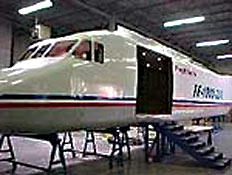 |
| The FF-1080's short take-off and landing capabilities will enable air-cargo carriers to expand service into many smaller areas and airports. |
"This project represents our commitment to bring jobs and economic vitality to all parts of New Mexico, especially our rural and Native American communities," Gov. Bill Richardson (D) said of the Utilicraft Aerospace deal. "I applaud President Shirley's commitment to economic development, and we are proud to be part of this unique partnership."
Some 210,000 people live in the Navajo Nation. The Navajos established a tribal government in 1923. The discovery of oil on the reservation several years earlier highlighted the need for a more systematic form of government. The Navajo Nation's capital is in Window Rock, Ariz.
The Navajo Nation's elected council must still give its final approval for spending some $33 million to buy one-quarter of Utilicraft Aerospace's stock. Shirley said that another $1.25 million of the investment would come from a Navajo Nation business-development fund.
Syracuse Jobs, Adding 300 More
by JACK LYNE, Site Selection Executive Editor of Interactive Publishing
 |
| AXA's decision will create 300 new jobs in downtown Syracuse (pictured) and will ensure the future of 700 more. |
SYRACUSE, N.Y. — The 700 MONY
Group employees in Syracuse, N.Y., can
exhale now. AXA Financial, the French affiliate
that officially acquired the MONY corporate family for $1.5 billion
on July 1st, 2004, has decided not only to stay in Syracuse; it's adding
300 new jobs there as well.
"We currently have 700 highly productive
employees in Syracuse, where MONY has maintained a customer-service
center for many years," AXA Financial President and CEO Christopher
M. "Kip" Condron
 |
| "AXA Financial is delighted that the strong MONY operations [in Syracuse] are now part of our company," said President and CEO Christopher M. "Kip" Condron (pictured). |
New York Gov. George Pataki (R) first announced AXA's decision in his Jan. 5th State of the State address. The lion's share of the attention, though, went to other expansions that the governor unveiled that day: three IBM-led projects that are bringing $2.7 billion in new investment to the Empire State. (For details, see this week's Blockbuster Deal, "IBM, Partners Creating 1,000+ Jobs with $2.7 Billion in New York Projects.")
But a whole lot was hanging in the balance in Syracuse. If AXA had decided to pack up and leave town, the overall net impact would've meant 1,000 jobs lost. MONY employees in Syracuse had expressed uncertainties about their future when the company's ownership changed over to French insurance giant AXA's U.S. subsidiary.
"The company could have consolidated operations elsewhere. This move shows a continued confidence in the New York economy and the business climate we have created under Gov. Pataki's leadership," said Empire State Development (ESD) Corp. Chairman Charles A. Gargano. "ESD has been working tirelessly with AXA Financial for many months, as well as coordinating with other state agencies and our local development partners to bring this important project to fruition."
Program Encouraged AXA's Project
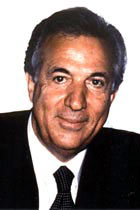 |
| "The company could have consolidated operations elsewhere," said Empire State Development Corp. Chairman Charles A. Gargano (pictured). "This move shows a continued confidence in the New York economy and the business climate." |
"We are excited about this development for Syracuse and our community," Driscoll said. "The recently approved Empire Zone boundary amendment is an example of the city's commitment to work with AXA to facilitate job growth in Syracuse. This is a result of our constant communication with the AXA Financial leadership."
State officials said that AXA's decision is also a direct result of the state's new brownfields program. AXA, they added, will be eligible to apply for a $1.25-million Empire State Development grant, plus other state and local incentives, including the Empire Zone Wage Tax Credit.
"AXA Financial will be an important part of the Syracuse economy as we move forward," said Pataki. "This decision sends a clear signal that this fast-growing company has confidence in New York's economy. . . . We will attract even more jobs to the region, and will be well on our way to reaching our goal of creating one million new jobs by the end of the decade."
AXA Financial has about 9,000 U.S. employees. With corporate brands that include Alliance Capital Management, AXA Advisors, AXA Distributors, AXA Equitable Life Insurance and Sanford C. Bernstein & Co., AXA's U.S. subsidiary has more than $550 billion in assets under management.
University Also Expanding Downtown
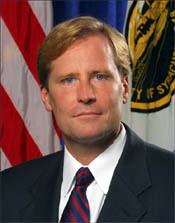 |
| "Our constant communication with the AXA Financial leadership" played a major role in the company's expansion decision, said Syracuse Mayor Matt Driscoll (pictured). |
One of them was Sutherland Global Services' decision to expand its sales operation. Rochester, N.Y.-based Sutherland announced on Jan. 7th that it will add 125 jobs at its Syracuse office. That will bring the company's total work force in Syracuse to 400 employees.
Sutherland, which provides outsourced contact center services and technology, decided to add the new jobs in Syracuse after a major expansion in one of its existing contracts, company officials said.
Worldwide, the company has about 10,000 employees.
In addition, Syracuse
University in December announced that it's expanding to establish
a major presence downtown. The university is buying 11 properties and
leasing another. Students and faculty members will begin occupying the
properties in the fall of 2005, said Chancellor Nancy Cantor.
Cantor, who took office on Aug. 15th of
last year, explained that the university's plans include establishing
a downtown arts cluster. A department of the College of Visual and Performing
Arts will relocate to the area, she said.
Cantor's plans also include greater collaboration
with downtown. The university plans to further that goal by hiring a
"community geographer" to work in the downtown area. That person will
work to identify and analyze city-wide problems. The university will
then join forces with the community in working to solve the problems.
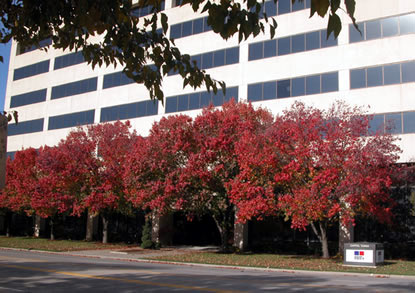 |
| Hill's will expand both its Topeka headquarters (pictured) and its local R&D operation. |
Hill's Jan. 6th expansion announcement comes after Colgate declared on December 7th of 2004 that it planned to sharply scale back operations. The New York-based company said that over the next four years it will close one-third of its 78 worldwide plants and eliminate some 12,000 jobs. That represents about 12 percent of Colgate's global work force of 37,000 employees.
Hill's, in contrast, seems to be barking up the right business tree. The company has established itself as one of the world's leading producers of premium pet food. With a comparatively modest work force of 2,600 employees, Hill's brought in $1.5 billion in revenues in 2004. That means that the pet-food company accounted for more than 15 percent of Colgate's total revenues while employing only about 7 percent of Colgate's total work force.
 |
| Avoiding mass-market retail channels, Hill's has succeeded in large part because of its popularity with veterinarians. Notice the "Veterinarian Recommended" notation on the trademark label (pictured) for the company's popular Science Diet line of products. |
Despite its considerable cutbacks, the parent company let the dogs out for the Topeka research expansion. Colgate singled out Hill's and its oral-care product lines for R&D increases.
The pet-care company's research expansion is particularly important in continuing the Topeka-based firm's success, said Bob Wheeler, Hill's CEO. More R&D spending, he explained, is critical in developing new nutritional science applications that will lead to improved and refined products.
Said Wheeler, "We look at this investment as a continued commitment to our ongoing growth and success as a business, while keeping our strong presence in the Topeka community."
Hill's has 900 employees in Topeka — more than a third of its entire work force worldwide. In addition to its headquarters, the company's local presence includes a large manufacturing plant and a Science and Technology Center.
Hill's latest expansion in Topeka will add 50 to 70 new jobs, company officials said. Those jobs will average more than $50,000 in annual pay, they noted.
Know Your Local Veterinarian
Hill's, in contrast, has registered its success while almost altogether avoiding mass-market retail channels. The company only sells its products through veterinarians, pet specialty stores and breeders.
 |
| Hill's top dog: Hill's Pet Nutrition was founded by Kansas veterinarian Dr. Mark L. Morris Sr., a strong believer in using carefully formulated nutrition to successfully manage diseases in pets. Morris' ideas were put to the test in 1943. Morris Frank, a young blind man, asked Dr. Morris if he could do anything to save his guide dog, Buddy, who was suffering from kidney failure. Morris in his kitchen devised the first Hill's Prescription Diet product; the company was founded soon after. As for Buddy, he survived, thrived and continued with his Morris (the two are pictured above). Photo: Hill's Pet Nutrition |
Veterinarians have been central in Hill's prosperity. Pet owners are among the world's most loyal consumers. And many vets are quick to recommend Hill's products.
The company annually funnels large amounts of capital into funding research and nutrition courses at every U.S. veterinary college. Hill's also donates a popular textbook on small-animal nutrition (written by the company's employees) to vet school students. In addition, it created the first nutrition certification curriculum for vet-clinic technicians. The company even donates thousands of pounds of its food products to veterinary students so they can feed their pets.
Hill's also keeps the rewards coming once aspiring pet doctors are in practice. Hill's wisely generous plan allows vets to share in reportedly as much as 40 percent of the profits from sales of its food products.
The company's Topeka plant makes Hill's wet canned food products, including Feline Oral Care, Prescription Diet Canine Science Diet, Science Diet Canine Light Small Bites and Science Diet Canine. Hill's Topeka plant announced its own $15-million expansion in 2002.
Hill's has requested a 10-year tax break from Shawnee County. The company will get a 100-percent exemption during that span on ad-valorem taxes for the space, machinery and equipment that are added as part of the expansion.
"An investment like this supports the concept that 80 percent of our growth will come from companies already doing business here," said Doug Kinsinger, president and CEO of the Greater Topeka Chamber and GO Topeka.
Colgate acquired Hill's in 1976 when the pet-food company was part of Houston-based Riviana Foods. A few years later, the company almost got rid of Hill's while unloading non-core businesses.
But a group of top Colgate executives lobbied against the move, and they won. They liked veterinarians' readiness to recommend Hill's products. It reminded them, the executives said, of dentists endorsing Colgate toothpaste.